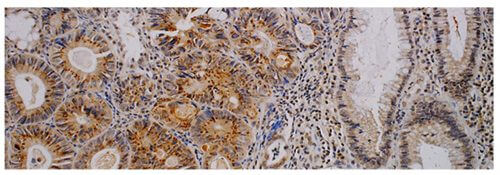Researchers at the Faculty of Medicine at the Technion discovered an enzyme that is essential for the development of cancerous tumors; It is estimated that damage to this enzyme and its related genes may serve as a future treatment method in certain groups of cancer tumors

Researchers at the Technion discovered a biological pathway that plays an important role in the development of cancerous tumors. This is a pathway involving a protein called RNF4 that increases cancer properties and is essential for the survival of cancer cells. The research, published in the journal Cell reports, was conducted in the laboratory of
Prof.-Member Amir Orin at the Rapaport Faculty of Medicine.
Transforming proteins (oncogenic) are a significant link in the formation of the cancer cell. As a rule, these are short-lived proteins that play important control roles in the amniotic cell; But in cancer cells, unfortunately, they exhibit a stability that gives these cells a longer life span. Furthermore, they increase the aggressiveness of the cancer cell and cause it to act in an increased and uncontrolled manner.
The research now being published reveals that said protein, RNF4, recognizes the converting proteins and gives them a structure that stabilizes them. According to Prof. Orin, "RNF4 is not an oncogenic protein per se, but transforming proteins and cancer cells depend on it to a great extent."
The gene was first identified in the yeast fly and then in human cancer cells. "We showed that the elimination of RNF4 leads to the death of the cancer cell, and from this the applied potential of the discovery is derived: the development of drugs that will inhibit the activity of RNF4, significantly shorten the half-life of converting proteins, and thus indirectly eliminate the cancer cell. We found an increased RNF4 level in 30% of colon cancer patients as well as a relationship between such an increased level and shorter life expectancy in a group of breast cancer patients. Preliminary results from our laboratory support the assumption that these findings are also valid for other types of cancer."
The ubiquitin system: degradation and stabilization
What is surprising about these discoveries, according to Prof. Orin, is the involvement of the ubiquitin system, known precisely for being responsible forDaughterdisordered proteins; "Here she does exactly the opposite - she stabilizing the cancerous proteins and prevents their breakdown."
Prof. Orin, a graduate of the MD/PhD track at the Rapaport Faculty of Medicine at the Technion, studied the ubiquitin system during his PhD, under the guidance of Research Prof. Aharon Chachanover. Prof. Chachanover won the Nobel Prize in Chemistry for 2004, together with his faculty colleague Prof. Avraham Hershko and their colleague Prof. Irwin Rose from the University of California, for the discovery of the ubiquitin system. This system, one of the most important and vital control systems in the living body, attaches a "death tag" to control proteins or damaged proteins. This tagging causes these proteins to be targeted for degradation in the proteasome, a multi-protein complex that acts as a protein shredder.
Prof. Orin is the head of the Stan and Ruth Flinkman Laboratory for the Study of Genetic Networks at the Faculty of Medicine and a member of the Integrated Center for Cancer Research at the Technion (TICC.
In 2005, he established the laboratory at the Technion, which focuses on two main groups of genes that play an important role in the development of cancer: (1) Identity networks - genes required to preserve the identity of the cells in the process of division and are an obstacle to the development of cancer; and (2) genes that are not cancerous but are essential for cancer cells, and therefore may serve as an effective target for molecular cancer therapy. For this purpose, the laboratory combines research using the fruit fly model (Drosophila) and cancer cell biology.
The current research was led by the doctoral students Jane Thomas וMonica worked (Currently a post-doctorate at Genentech pays), and it was conducted within the SignGene program shared by the Technion, the Hebrew University and three research institutions in Germany. It was also attended by DrRostislav Novak and dr Yaniv Zohar, members of the "Futures" program shared with the Faculty of Medicine at the Technion and the Rambam Medical Center. The research was conducted in collaboration with Dr. GJulian Hauberger and Prof. Walter Birchmeier From the Max Delbruck Institute in Berlin, Prof. Alan Schwartz from the School of Medicine at Saint Louis University, and Prof. Rafi Kopen From the Department of Developmental Biology at Children's Hospital in Cincinnati, Ohio. The research was supported by the generous assistance of the ICRF, the Flinkman-Marandi family and the Rapaport Institute for Cancer Research.
For the full study In the journal Cell reports click here
